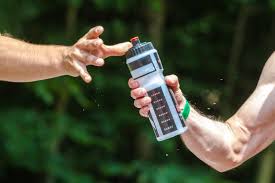 Our body needs water to function on a daily basis. Water helps regulate body temperature, transport nutrients, remove waste products, digest food and strengthen joints. Therefore, to maintain adequate water levels in the body is very important. Most of us do not realize how easily and quickly we can become dehydrated. Especially during exercise or physical activity, we are prone to losing water from our bodies quickly.
Our body needs water to function on a daily basis. Water helps regulate body temperature, transport nutrients, remove waste products, digest food and strengthen joints. Therefore, to maintain adequate water levels in the body is very important. Most of us do not realize how easily and quickly we can become dehydrated. Especially during exercise or physical activity, we are prone to losing water from our bodies quickly.
What causes us to sweat?
When we exercise or engage in any physical activity, our body temperature rises. To get rid of this extra heat, our body extracts sweat. This is a natural reaction to cool down our body. Sweat is composed of electrolytes (such as sodium) and, for the most part, water. Therefore, when we exercise, we lose a large amount of this precious fluid, which we should replenish.
Other reasons for losing water
Most of us know that sweating leads to water loss in the body. However, in addition to perspiration, physically active people may lose water in the following ways:
- fluid loss during breathing and urination,
- water loss in feces due to a high-fiber diet,
- increased water supply during digestion and protein excretion in the case of diets.
Usually this amount is insignificant, but it can become considerable if an athlete consumes less fluid for training purposes.
Body dehydration impacts
While everyone knows that water is essential for proper functioning, few of us realize the extent to which proper hydration affects the body’s performance during physical activity. When dehydration is severe, the following problems can occur:
- mental impairment and negative effects on short-term memory, mood, visual motor skills and arithmetic ability,
- problems in performing exercises and other physical activities,
- irregular heart rate, sweating and thermoregulation problems.
How much water?
The need for fluids is an individual matter. The type of physical activity, its duration and intensity, fitness level, metabolic rate, humidity and ambient temperature all affect how much water we may need.
Here are some general tips to avoid dehydration during physical activity:
- Before exercise – drink about 500-700ml of water at least 2 hours before exercise/sports. Additionally, drink 200-400ml of water 10-15 minutes before exercise.
- During exercise – if exercising for less than an hour, drink 100-250ml of water every 15-20 minutes. If you exercise for more than an hour, drink 100-250ml of a sports drink (containing electrolytes and carbohydrates) every 15-20 minutes.
- After exercise – for every kg of weight lost during intense exercise, drink 1.2-1.5l of water. To accurately determine the amount of water to consume, we should weigh ourselves before and after training.
Finally, it is very important not to drink too much fluid (more than 1l per hour) during training as overhydration can also cause negative effects.

